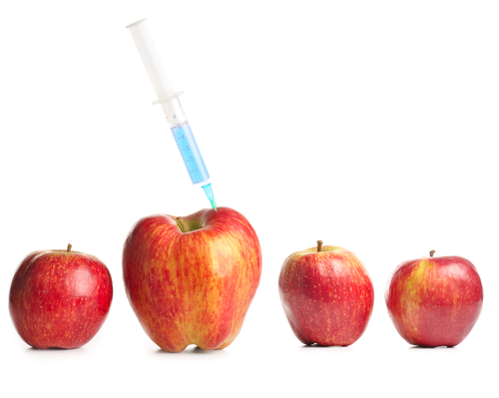A GMO is a plant or animal that has been genetically modified through the addition of a small amount of genetic material from other organisms through molecular techniques.
Genetically modified organisms, GMOs, are designed to combine favorable genetic traits not usually found together in nature into a single, superior organism.
 GMO corn of various types has been bioengineered to include genes from other plants in order to produce better quality corn, resist pests and parasites, produce larger yields and to thrive under a wider range of environmental conditions.
GMO corn of various types has been bioengineered to include genes from other plants in order to produce better quality corn, resist pests and parasites, produce larger yields and to thrive under a wider range of environmental conditions.
Benefits
1. Insect Resistance
These genetically modified corn were bred to develop a resistance towards pests. Hence, they can now be grown where pest infestations used to destroy crops. Furthermore, farmers no longer need to use large amounts of toxic pesticides that kill beneficial insects in the process.
2.Disease Resistance
The conventional corn is vulnerable to plant diseases, including those caused by fungi and bacteria. While all plants can potentially be infected by diseases, some plants have greater resistance towards more diseases. Corn bioengineered to carry disease resistance genes from naturally resistant plants contain lower levels of mycotoxins, substances that are potentially carcinogenic to humans and produced by fungi growing on insect-infested, non-GMO corn plants.
3.Herbicide Resistance
Herbicides are often used by farmers to kill weeds that harm the growth of crops. While some crops do resist herbicides, some remnants of herbicides may be absorbed by the crops & remain in the food that are eventually consumed by humans. GMO corn has been engineered to be resistant to these herbicides (e.g. Glyphosate), reducing potential health risks.
4.Tastier Corn of Higher Quality.
The flavor of the corn becomes significantly enhanced after genetic modification. Those who struggle to eat corn due to it’s unpalatable taste may enjoy eating genetically modified corn more. Since taste is one of the most important factor consumers make during purchasing decisions, genetically modified corns have hence become an alternative and viable option for consumers.
 5. Additional Nutritional Benefits.
5. Additional Nutritional Benefits.
Genetically modified corn allows modifications to the food in a positive way via the addition of extra nutrients, vitamins and minerals.Genetically modified food can hence be a solution for people who aim to maintain an ideal, healthy weight, creating foods with additional nutritional benefits. Both developed and less developed countries can benefit from the consumption of genetically modified corn. Genetically modified food can provide sufficient and proper forms of nourishment to their people. This is especially important as inaccessibility to healthy food would be a deterrent.
Disadvantages
1.Lack of Environmental Friendliness.
Genetically modified foods (such as corn) are usually grown in areas with non-genetically modified plants. This increases the risk of cross breeding. An examples is when weed, a non genetically modified plant starts cross breeding with genetically modified corn. Farmers then have to increase their efforts of genetic modification, because corn that is grown to be resistant to herbicides can lead to the growth of weeds and other plants that are also unable to be killed off with herbicide. Any time food is grown in a place that would not normally be hospitable for farming, there is a major risk of long term damage to the environment.
2.Same Costs and Very Little Economic Relief.
Genetically modified corn takes just as long to grow as the conventional corn. Additional money is often spent to clear out weeds and plants that have become crossbred with the corn and developed an immunity to herbicide. Genetically modified corn hence increases overall costs instead of providing a significant decrease.
3.Large Increase In Allergic Reactions.
Genetic food are often altered. For genetically modified corn, studies have shown that consumption has lead to a severe increase in the population’s occurrence of allergic reactions. Food related allergies are a growing problem on society namely triggered by excessive consumption of genetically modified food. These allergic reactions from Genetically Modified Corn can be caused by a number of factors. Someone who avoids the, consumption of the corn can still be at risk. This is because when an animal on the farm where genetically modified foods are being grown gets into a GMO corn crop and consumes a large amount, the person who is susceptible to allergic reactions may end up in the hospital from consuming the animal meat.
References:
“Bt-Corn: What It Is And How It Works | Entomology”. Entomology.ca.uky.edu. N.p., 2017. Retrieved 19 Feb 2017, from: https://entomology.ca.uky.edu/ef130
“China Still Evaluating Syngenta’S GMO MIR162 Corn”. Natural Society. N.p., 2017. Retrieved 13 Feb 2017 ,from: http://naturalsociety.com/china-refuses-syngentas-gmo-mir162-corn/
“Gmos: The Pros & Cons Of Genetically Modified Food » Newport Natural Health”. Newport Natural Health. N.p., 2017.
Retrieved 12 Feb 2017, from: https://www.newportnaturalhealth.com/2013/07/gmos-the-pros-cons-of-genetically-modified-food/
“List Of Pros And Cons Of Genetically Modified Corn”. OccupyTheory. N.p., 2017
Retrieved 20 Mar 2017, from: http://occupytheory.org/list-of-pros-and-cons-of-genetically-modified-corn/
Meyer, Melody. “GMO’S: The Evolution Of Emerging Technologies”. Organic Matters. N.p., 2017.
Retrieved 13 Feb 2017, from: https://organicmattersblog.com/2015/08/24/gmos-the-evolution-of-emerging-technologies/
Pickut, Walt, and Walt Pickut. “What Are The Benefits Of GMO Corn?”. LIVESTRONG.COM. N.p., 2017. Retrieved 27 Mar 2017, from:http://www.livestrong.com/article/254564-what-are-the-benefits-of-gmo-corn/

